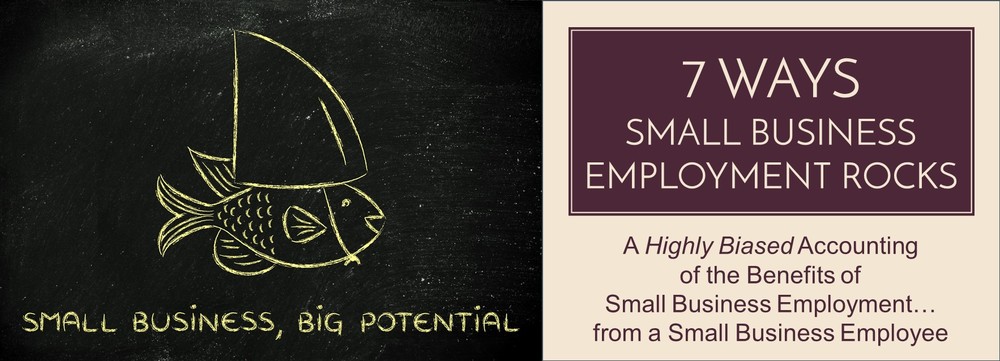7 Ways Small Business Employment Rocks
When envisioning our future careers, how many of us dreamt of lofty corner offices, earning six (or more) figures a year, with all of the perks and benefits that come with employment in big business? Even if we logically knew that it would be a difficult dream to achieve (only 8% of the US workforce earns $100,000 or more, according to the Wall Street Journal), odds are it didn’t stop us from fantasizing about the yacht we’d buy after we landed that prestigious job straight out of school, or planning exciting jaunts around the world, or envisioning the house of our dreams that we’d build with our first bonus.
We might have dreamt of that position, but reality brought many of us down a different path into the world of small businesses—defined as “an independently owned and operated company that is limited in size and in revenue depending on the industry”. This is especially true in the promotional products industry, in which 98% of businesses are classified as small businesses.
That’s a lot of words to lead into employment with small business generally being a very different beast from employment with big business. Every company is different, but many share some characteristics that can be beneficial for someone looking to be more than a cog in the big business machine. (I’ll freely admit to my bias, having worked in both and developed a strong preference.) These are some of my favorites:
- Small businesses allow their employees to spread their wings.
In a small business, especially one with a strong seasonal bent, it’s not cost-effective to hire a person for a single job duty, so most employees wear many hats. To use myself as an example: my title is Sales Consultant, but I also assist with IT (which was my degree focus), website maintenance, developing and maintaining support materials, proofing, and (as is apparent if you’re reading this) contributing to the blog, along with assisting with a variety of other projects that don’t fit any one category and providing back-up for other departments as needed. Every day is different, and every day allows me to build my skillset. In big business, employees are usually limited by their position: a customer service agent doesn’t have any input on product development, an order processor doesn’t contribute to marketing efforts, a designer doesn’t help with sales or trade shows. Some people thrive within defined roles, others find it stifling. - Small businesses offer more opportunities for their employees to contribute.
In the vein of employees being limited by their positions, small businesses offer more opportunities for their employees to work outside of their title, which can provide unique perspectives. Big business tends to have roadblocks to the dissemination of ideas, structurally separating employees into distinct units that have a difficult—if not impossible—time communicating ideas outside of their usual purview. Small businesses, being by nature less segregated, allow employees more opportunities to pass along ideas, or share the neat ad they saw, or suggest a way in which a procedure might be streamlined. Additionally, with the many hats employees wear, there’s a greater awareness of how other departments and teams function, allowing employees multiple viewpoints from which to share ideas and feedback. - Small businesses provide their employees with more autonomy.
Big business is full of rigid procedures—lots of procedures—that employees are expected to follow. When working with an enormous staff, those procedures are logical to more easily provide consistent results. In small businesses, however, rigid procedures can prove more limiting than logical, and so most employees are able to develop their own; the employee can be given a task and let loose to accomplish it as they see fit. Even procedures that were in place can be refined and streamlined by allowing employees to build upon them with their own experience and knowledge. - Small businesses allow a sense of the company as a community to grow.
Big business does not often foster strong employee relations, especially within disparate departments, and employees can be left feeling isolated, working in a company largely comprised of strangers. Because small business employees so often work outside of their job titles, however, they’re better able to see where things overlap and how their tasks fit in to the whole. No department is an island, and employees are more easily able to see the goal the company is working toward and how to band together to achieve them. - Small businesses are better able to show their appreciation.
While small businesses lack the big budgets for showing their appreciation to their employees, they have more opportunities to demonstrate that appreciation with a personal touch. Employee events, potlucks and catered meals, even simple praise from the upper echelons of management can be quite uplifting and further build that sense of community. Bonuses and fancy gifts certainly have their appeal and purpose (especially as we’re in the industry to provide them), but don’t underestimate the value of a simple handshake and congratulations from the company president, either. - Small businesses tend to be more relaxed and flexible.
Big business requires structure to function effectively, simply the nature of the beast. For example, most big businesses have strict attendance policies—something that small businesses generally have more leeway on. Small businesses are usually better able and more willing to accommodate absences without the penalties big business policies usually impose. (For a previous position, I once drove into a blizzard to make up hours on a Saturday. One half-mile and complete white-out later, I decided the warning I’d receive for missing work was worth not dying.) Additionally, many small businesses are able to provide more flexible hours and remote work opportunities, in addition to a more relaxed office environment—which often includes a much more relaxed dress code than you’ll find it a big business. - Small businesses provide employees opportunities to build stronger relationships with management and owners.
A story: One year, whilst I was working at a large company with multiple offices and thousands of employees, the company provided us with a free lunch from the company cafeteria for Thanksgiving. We collected our pre-loaded plates and sat down to eat. During the course of the meal, a gentleman joined the table at which my unit sat and watched us without saying a word until we got up to go back to work, at which point he chided me for not eating my green beans (which I despise) and walked away. When we returned to our unit, I asked my supervisor who he was and discovered that he was our company’s CEO. I had no clue—I couldn’t even tell you his name—but never forgot that his sole interaction with our unit was to scold me like a recalcitrant child.
Big businesses are full of anonymity, with multiple levels of employees that rarely mingle. (Never mind the CEO—I couldn’t even have told you who my supervisor’s supervisor was.) Small businesses, however, rarely have the capacity for that much distance, and most employees will at the very least be familiar with the company’s top dogs, if they don’t work directly with them. That accessibility builds upon the other benefits, in addition to providing employees with a better sense of their worth; they’re not a nameless face in the crowd, but instead are recognized and valued.
Working in a small business isn’t for everyone, just as working in big business wasn’t for me. Small businesses offer different opportunities and environments—and challenges, too—but they’re valuable opportunities to consider for those seeking something different. You wouldn’t be alone as a small business employee, either—according to the US Small Business Administration, 99.9% of US businesses are small businesses, and they employ 57.9 million people—47.8% of the private workforce! Your career goals, work style, and preference will naturally affect your choice, as well, but don’t write off employment just because it’s with a small company—you just might find it’s the perfect fit.



